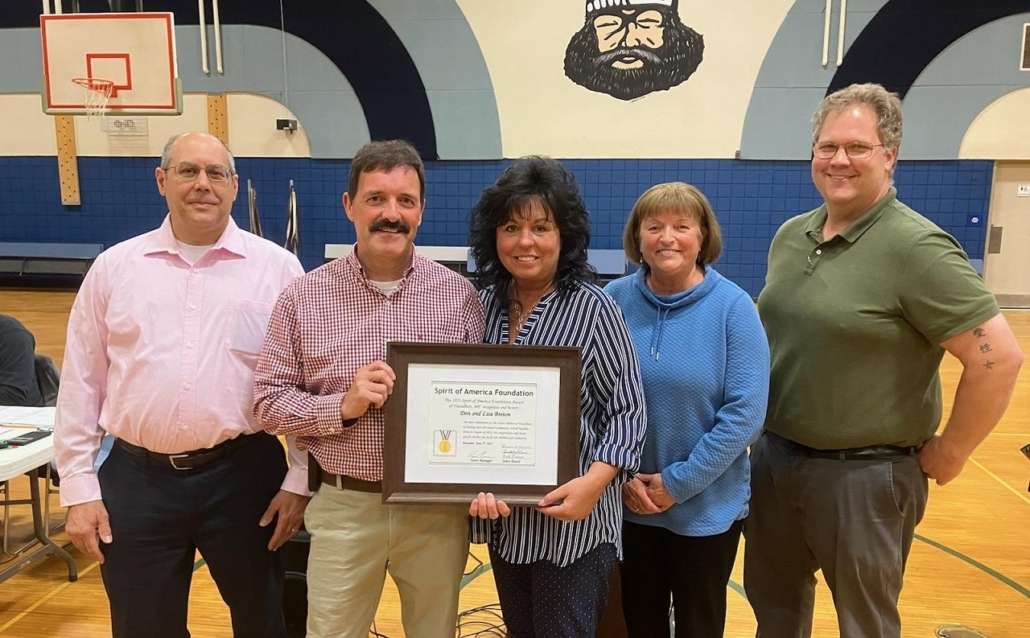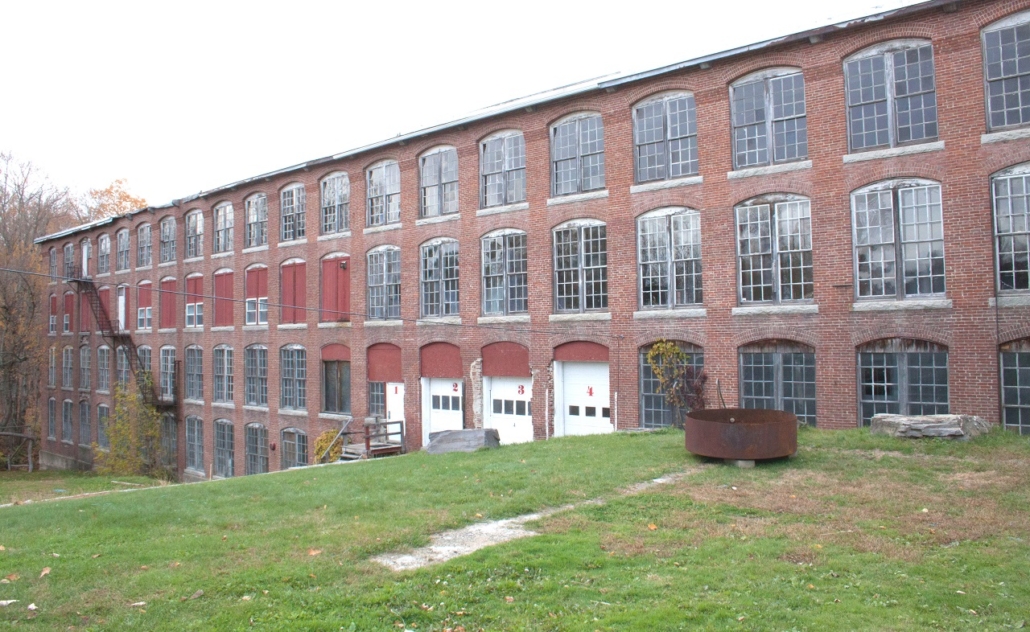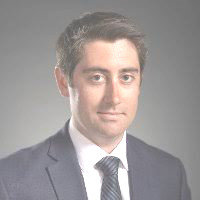Inland Hospital and Purdue Global collaborate on new Simulation Center
/0 Comments/in Community, Waterville/by Website Editor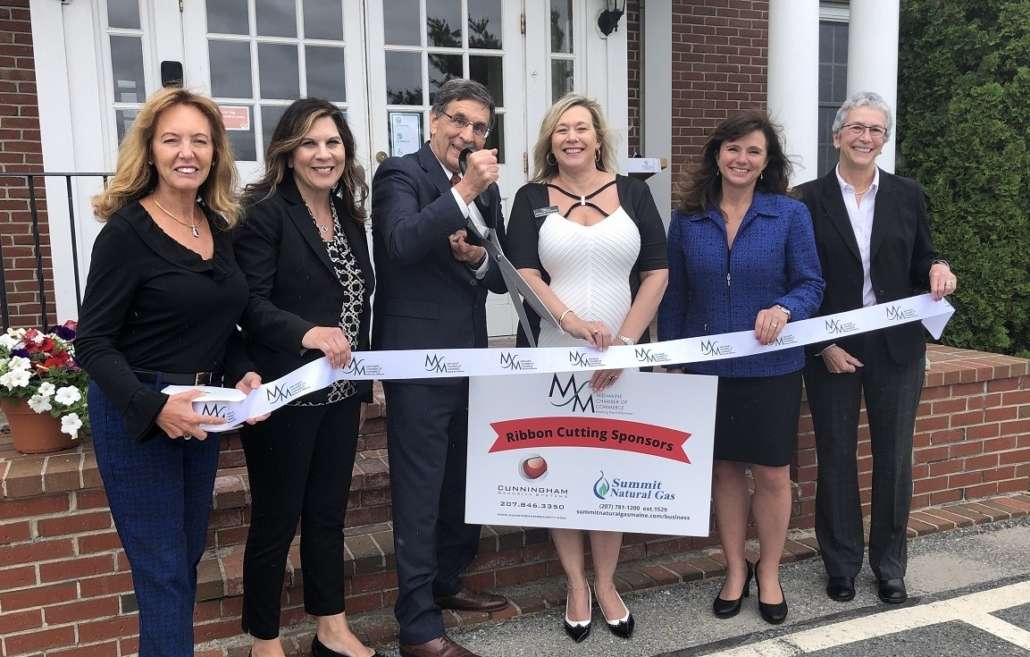
Leaders cut the ribbon (left to right): Kathy Corey, chair of Northern Light Health board of directors; Dr. Melissa Burdi, dean/VP of Purdue Global School of Nursing; Dr. Frank Dooley, chancellor of Purdue Global; Kim Lindlof, president of Mid-Maine Chamber of Commerce; Tricia Costigan, president of Inland Hospital; and Crystal Olsen, chair of Inland Hospital board of trustees. (contributed photo)
A unique healthcare education collaboration kicked off in Waterville on June 6, 2023 as Northern Light Inland Hospital and Purdue Global officially opened the new Simulation Center for Healthcare Education and Excellence. Inland Hospital staff and board members, Purdue Global staff and students, community educators, local EMS and fire department staff, community leaders, and Mid-Maine Chamber of Commerce members joined together for the grand opening of the new simulation center, located on the Inland campus. Tours and demonstrations showed off the center’s capabilities.
The center will provide unique hands-on training for Purdue Global nursing students, Inland Hospital staff, and also give access to EMS and the community’s other first responders.
The simulation center “patients” include high-tech adult, pediatric, labor/delivery mother, and neonatal manikins. They will be used for the Purdue Nursing Program and a variety of Inland Hospital staff courses, such as Advanced Life Support, Pediatric Life Support, and Neonatal Resuscitation. The four training manikins represent an investment of nearly $300,000 by Purdue Global.
“We’re excited to enhance the delivery of healthcare by developing new and innovative methods to educate and train in a simulation center like this with a laser focus on patient safety and the transition to practice,” noted Melissa Burdi, Purdue Global vice president and dean of the Purdue Global School of Nursing.
Inland leaders point out that providing exposure to various medical scenarios through simulation training allows healthcare professionals to practice and get performance feedback in real time. According to Courtney Cook, RN, vice president of Nursing and Patient Care Services at Inland Hospital, “The more exposure that a nurse or any clinical staff member has to any given situation, the more confident and comfortable they become – allowing them to provide the best care possible. The ability to walk through the treatment process, without the high stress of a patient’s life at risk, is invaluable.”
Tricia Costigan, president of Inland Hospital, praised the new collaboration saying, “This is a big win for our community and a true collaboration that benefits the patients and communities that we all proudly serve.”
“Today is an important day,” remarked Dr. Frank Dooley, chancellor of Purdue Global. “Everyone understands the need to educate more nurses to provide care. And that takes imaginative problem solvers to find solutions like the center we dedicated today. Well done.”
Inland Hospital is the fourth simulation center collaboration Purdue Global has across the country.
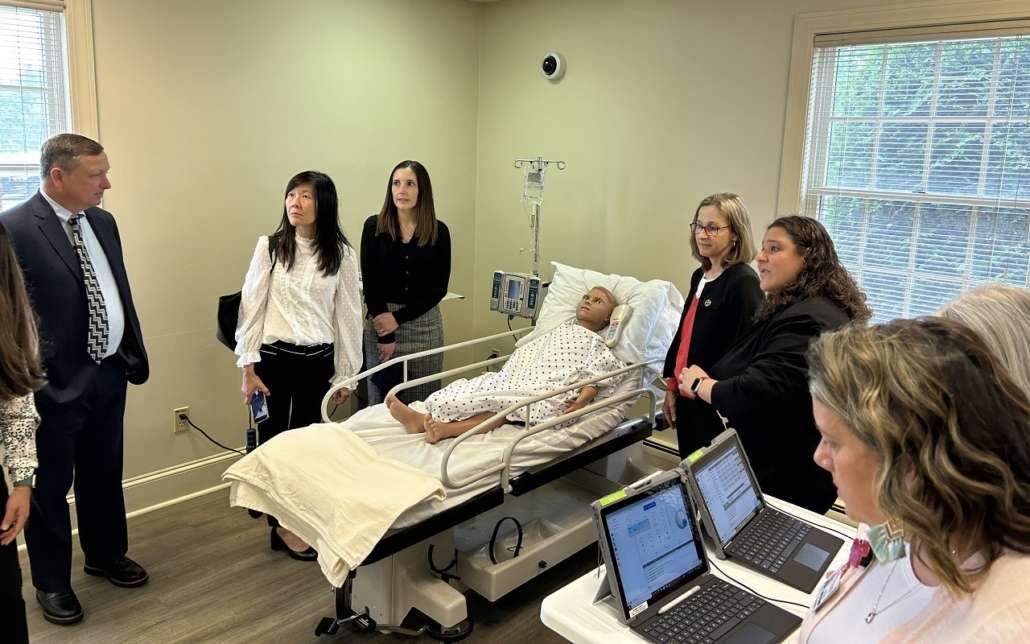
Community members tour the new Simulation Center and see demonstrations of the high-tech “patient” manikins. (contributed photo)
About Purdue Global
Purdue Global is a public, non-profit institution that offers online Nursing education and many other degree programs. Part of the respected Purdue University system, Purdue Global delivers personalized online education tailored to the unique needs of adults who have work or life experience beyond the classroom, enabling them to develop essential academic and professional skills with the support and flexibility they need to achieve their career goals. For more information visit purdueglobal.edu.
About Northern Light Inland Hospital
Northern Light Inland Hospital is a Waterville community hospital with primary and specialty care physician offices in Waterville, Oakland, Unity, and Madison. We are proud to be part of Northern Light Health, a healthcare delivery system of more than 10,000 employees across Maine. Our mission is to improve the health of the people and communities we serve. Part of that mission is asking “How are You?” to reconnect with people and families so we can find new and innovative ways to make healthcare work for all of Maine. Learn more at northernlighthealth.org/Inland and northernlighthealth.org/Howareyou.
Angela Hallee promoted to ND Winslow branch manager
/0 Comments/in Community, Winslow/by Website EditorNew Dimensions Federal Credit Union is pleased to announce its new Winslow Branch Manager, Angela Hallee, who came on board in January 2022 as head teller with 15 years in the financial industry. Soon after her arrival, her financial knowledge and experience owning a small business in Waterville, made her an excellent choice to fill the role of branch supervisor, and then finally, she was placed into her current role as the Winslow branch manager. Hallee is an alumna of Waterville High School and continues to live in Waterville while spending as much time with her grandchildren as possible.
Angela is a hard worker who goes above and beyond in the best interest of her staff and members. Angela states, “I love my position at New Dimensions’ Winslow Branch. I am excited to watch and participate in my staff’s growth and development. I find my work exciting and look forward to working with an amazing team daily. Everyone has made me feel welcomed and encouraged in my new position. I want to thank everyone at NDFCU and members who have made my transition easy.”
Ryan Poulin, CEO, who helped streamline Angela into her current role, states, “Our members deserve exceptional service, and I felt Angela would be an integral part of our team embodying the high standards our members have come to expect. I look forward to working with Angela and watching our Winslow branch grow.”
EVENTS: Senior Seminar to be held in Vassalboro
/0 Comments/in Community, Events, School News, Vassalboro/by Website EditorA Senior Seminar, hosted by Gateway Retirement Solutions, will be held at The Mill, 934 Main St., in North Vassalboro, on Wednesday, June 21, from 9:30 a.m. to noon.
The seminar will cover Medicare parts A, B, C, and D, prescription coverage and how to compare different plans. What to do with a 401k upon retirement, and what are better options.
Speakers will be Jessica Cole, Medicare broker, life insurance broker and CoverMe broker; David Godfrey, financial advisor, and Brian Arsenault, property and casualty broker.
Ecology Ctr. accepting ninth grade enrollment
/0 Comments/in Community, Unity/by Website Editor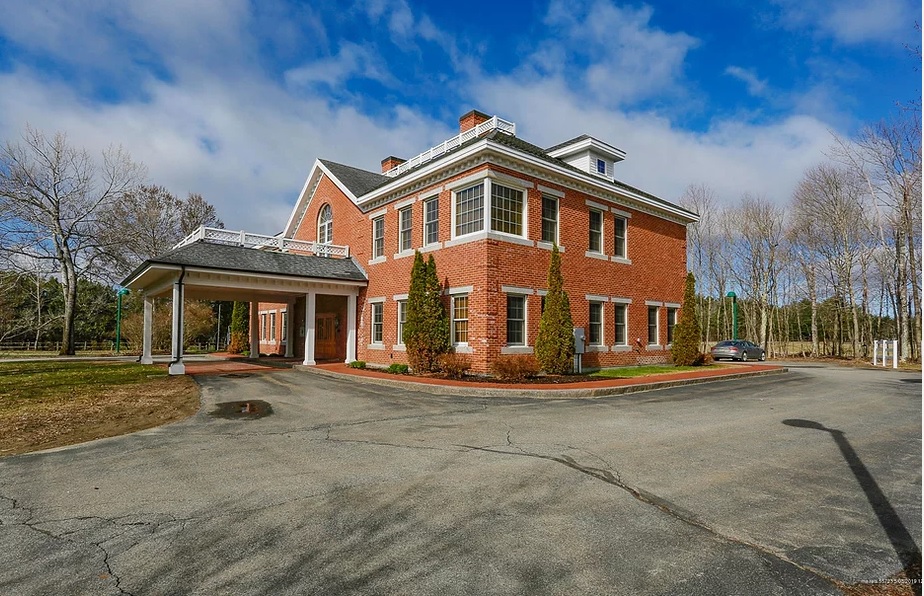
Ecology Learning Center (photo: Unity College)
The Ecology Learning Center, a public charter high school (9-12 grades) in Unity, enrollment is still OPEN for 9th grade! If interested, please fill out the Intent to Enroll form on our website.
At the Ecology Learning Center, we offer:
focused English, math, history, and science instruction; French and Spanish language courses, taught by native speakers; art electives, including music and woodworking; outdoor adventure and leadership training; FREE breakfast and lunch using locally-grown produce, prepared by students.
Reach out to info@ecologylearningcenter.org with questions.
Hemenway announces new release
/0 Comments/in Central ME, Community/by Website Editor Band member, Northport resident and songwriter for “The Slouch in the Couch Children’s Corner Band,” Stephen J. Hemenway, announces the release of a new music album from the band titled, Songun’s Fer Youngun’s. The original music features upbeat songs including three “book” songs that tell the stories of three published Slouch in the Couch children’s picture books.
Band member, Northport resident and songwriter for “The Slouch in the Couch Children’s Corner Band,” Stephen J. Hemenway, announces the release of a new music album from the band titled, Songun’s Fer Youngun’s. The original music features upbeat songs including three “book” songs that tell the stories of three published Slouch in the Couch children’s picture books.
Billed as, “The Original Rock n’ Roll Band for all ages,” the new album can be heard on over 150 music platforms, including but not limited to, Itunes, Spotify, Amazon, Youtube and Deezer. For more information, go to the band’s webpage at: slouch.org.
Outdoor Eucharistic processions planned for Sunday
/0 Comments/in Central ME, Community, Events/by Website Editor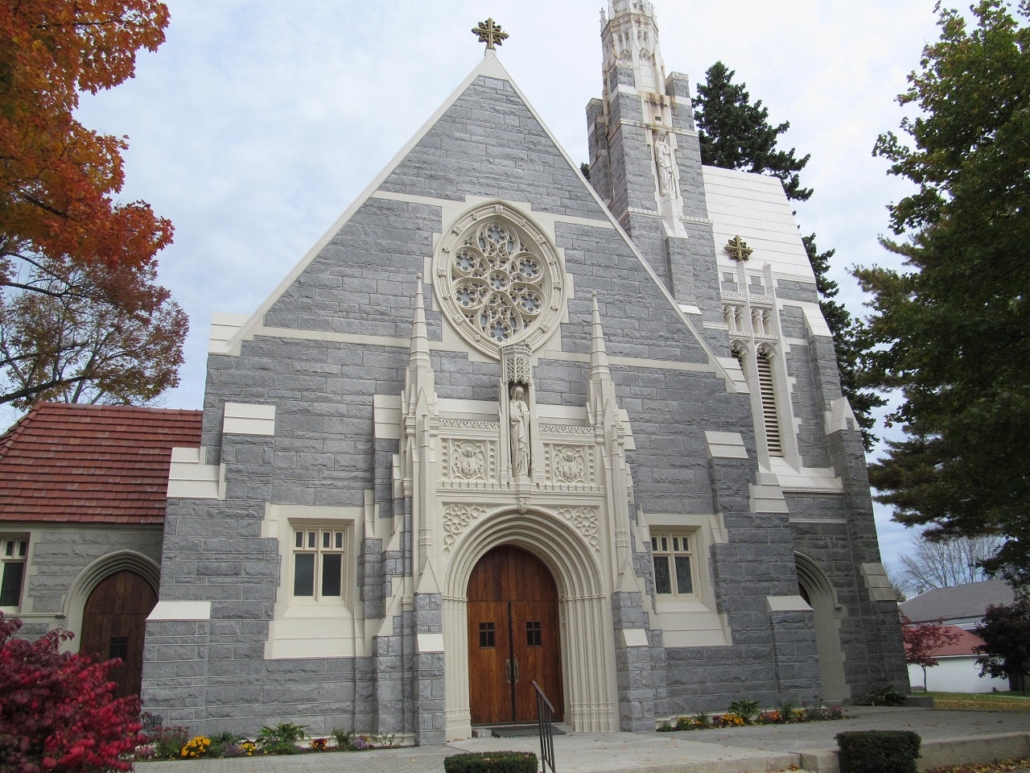
St. Mary’s Catholic Church
In honor of the Feast of Corpus Christi (also known as the Solemnity of the Most Holy Body and Blood of Christ) on Sunday, June 11, parishes around Maine are planning outdoor Eucharistic processions and other special events to celebrate the real presence of Christ in the Eucharist, recalling the institution of the Eucharist at the Last Supper. The feast is often marked by Eucharistic processions, during which the Blessed Sacrament is carried in a monstrance through the church and into the streets. Many also spend time in Eucharistic adoration on the solemnity.
An outdoor Mass will be held at the Grotto, at St. John the Baptist Church, at 26 Monument Street, on Sunday, June 11, at 10:30 a.m. All are welcome but you are asked to bring your own chair. In case of rain, the Mass will be celebrated inside the church. All are also invited to join Corpus Christi Parish in praying a novena on June 2-10. You can either pray on your own or join the Fraternity of Secular Franciscans via Zoom each night at 7 p.m.
For more information, visit the Feast of Corpus Christi section on the diocesan website at www.portlanddiocese.org/feast-corpus-christi.
Oakland creates new TIF district to support downtown revitalization
/0 Comments/in Community, News, Oakland/by Website EditorEncompassing 37.27 acres, the Maine Department of Economic and Community Development has approved a newly designated Downtown Tax Increment Finance (TIF) district within the Town of Oakland. The new district will allow the municipality to stimulate investment, encourage business expansion and retention, attract new businesses, and boost beautification initiatives while supporting the Town’s growing vibrancy.
“This newly-created TIF district will make a lasting impact in the Town of Oakland by making the downtown more investable, safer, more pedestrian-friendly, and directly aligns with the town’s vision of supporting business development and retention,” said Oakland Town Manager Ella Bowman. “I want to thank the municipal staff and town council who have worked to help advance this initiative, the Oakland Downtown Redevelopment committee for their dedication to this initiative, who was a key driver behind the project, and all the residents and community groups who voiced their support.”
Plans for TIF funding realized from the district will be utilized to support infrastructure, business growth, facade improvements, marketing the downtown, expanding and improving area trail connections, and more. Funding will also be leveraged to secure additional investment and incentivize business recruitment and retention in the district.
“Oakland is driving impact and support for residents, businesses, and remote rural workers through this project, incentivizing investment, cultivating new business attraction, and ultimately contributing to the overall economic well-being of the town and region,” said Central Maine Growth Council Director of Planning, Innovation, and Economic Development Garvan Donegan. “This newly-approved TIF district will create the necessary conditions to support economic development along Main Street and downtown revitalization in the Town of Oakland as a whole.”
Erskine Academy announces top 10 seniors (2023)
/0 Comments/in China, Community, Erskine, School News/by Website Editor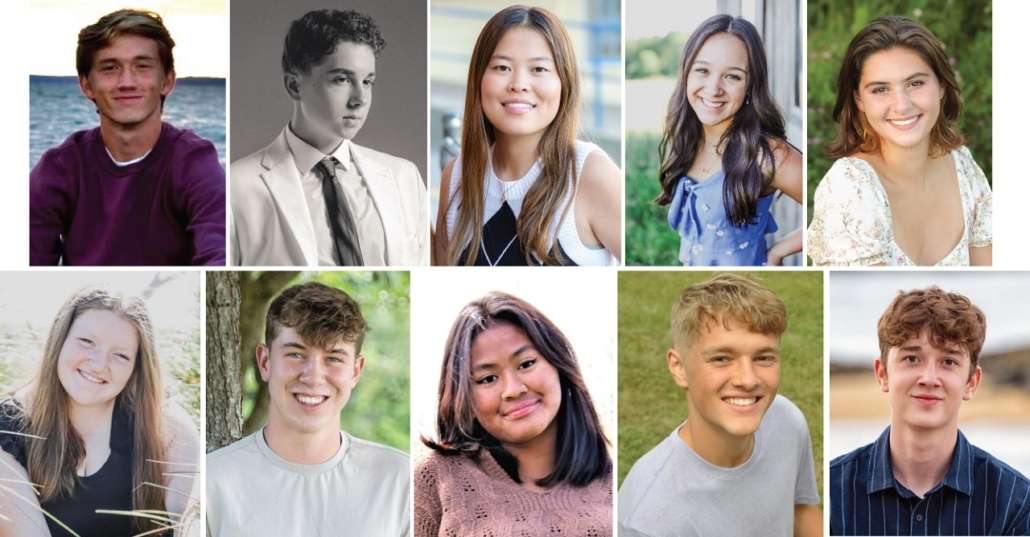
Top row, right-to-left: Malachi Lowery, Damon Wilson, Lily Matthews, Grace Hutchins, Sophia Pilotte; Bottom row: Mackenzie Toner, Gabriel Pelletier, Nabila Harrington, Carson Appel, Noah Rushing.
Erskine Academy has announced the class of 2023 Top Ten Seniors.
Valedictorian is Malachi Lowery, son of Hollie Hilton, of Vassalboro, and John Lowery, of Ellsworth. Throughout his four years at Erskine, Malachi has participated in such activities as Student Council, National Honor Society, the EA Leadership Team, EA Theater, LEO Club, the International Outreach Coalition, Soccer, Indoor Track, Tennis, and he has completed over 100 hours of community service projects. Malachi is a four-year honor roll recipient and has received awards of distinction in Algebra, English, Physics, U.S. History, and Physical Education. Malachi has served as Vice-President of the Class of 2023, he has been a Renaissance Recognition and Senior of the Trimester award recipient, and is a Maine Principals’ Association Award recipient. Malachi plans to attend the University of Maine to study Electrical Engineering.
Salutatorian is Damon Wilson, son of Aimee and Jeffrey Wilson, of Windsor. Damon has participated in such activities as National Honor Society, Student Council, EA Theater, the EA Leadership Team, Prom Committee, and served as the Field Hockey Manager. Damon has also served as President of the Class of 2023 for three years and as one of two Class Marshals in 2022. A student who has received high honor roll distinction every trimester, Damon was the recipient of awards of excellence in Algebra, Geometry, PreCalculus, Statistics, US History, and Spanish. In addition, Damon has also been a recipient of the George Eastman Young Leaders Award and Renaissance Recognition and Senior of the Trimester awards. Damon plans to attend Kennebec Valley Community College in the General Studies program.
Third in academic standing is Lily Matthews, daughter of Kim and John Matthews, of China. Lily is a member of National Honor Society and she has participated in such activities as Student Council, EA Theater, Future Business Leaders of America, LEO Club, Math Team, Speech Team, the Girl Up Club, Soccer, and Lacrosse. In addition, Lily has completed nearly 100 hours of community service projects. Lily has received high honor roll distinction every trimester, has received awards of achievement in Biology and Calculus, and is a Bausch & Lomb Honorary Science Award recipient. Lily plans to attend Syracuse University to major in Mechanical Engineering.
Fourth in academic standing is Grace Hutchins, daughter of Teresa and Randy Hutchins, of Litchfield. Grace has participated in such activities as National Honor Society, Student Council, Future Business Leaders of America, the EA Leadership Team, Math Team, Field Hockey, Basketball, and Lacrosse. Grace has received awards of distinction in Geometry, PreCalculus, Calculus, and Physical Education, and she has achieved four year honor roll status. In addition, Grace was the recipient of the Society of Women Engineers Award, served as one of two Class Marshals in 2022, and she is a Renaissance Senior of the Trimester award recipient. Grace plans to attend the University of Maine with a major in Civil Engineering.
Fifth in academic standing is Sophia Pilotte, daughter of Andrea Pilotte, of Palermo, and Aaron and Michelle Pilotte, of Warren. Sophia is a member of National Honor Society and has been a participant of the International Outreach Coalition, EA Theater, LEO Club, Student Council, and Soccer. Sophia has also completed over 150 hours of community service projects. Sophia has received the Phi Beta Kappa Award, and is a four year honor roll recipient. Sophia plans to attend the University of Maine with an undeclared major.
Sixth in academic standing is Mackenzie Toner, daughter of Thomas Toner, of Windsor, and Chrystal Toner, of Augusta. Mackenzie is a member of National Honor Society and she has participated in such activities as Future Business Leaders of America, Field Hockey, Basketball, Softball, and she has completed over 200 hours of community service activities. Mackenzie is a four-year honor roll recipient, has received a Renaissance Senior of the Trimester award, and received the Smith College Book Award. Mackenzie plans to attend Thomas College, in Waterville, with a major in Digital Marketing Management.
Seventh in academic standing is Gabriel Pelletier, son of Hilary and Ryan Pelletier, of China. Gabriel is a member of National Honor Society and he has participated in such activities as Future Business Leaders of America, Soccer, Basketball, Baseball, and has completed nearly 100 hours of community service activities. Gabriel is also a four-year honor roll recipient. Gabriel plans to major in Biology at the University of Maine.
Eighth in academic standing is Nabila Harrington, daughter of Paul Harrington, of China, and Nita Harrington, of Waterville. Nabila has been a member of such activities as the Speech Team, LEO Club, the EA Leadership Team, HOPE (Helping Others Persevere at Erskine), Soccer, and Lacrosse. Nabila has received honor roll distinction every trimester, and she has received awards of excellence in Social Studies and French. Nabila plans to attend the University of New England with a major in Medical Biology.
Ninth in academic standing is Carson Appel, son of Suzanne and William Appel, of Windsor. Carson is a member of National Honor Society, and he has participated in such activities as Student Council, LEO Club, Math Team, the EA Leadership Team, Soccer, Basketball, Baseball, Tennis, and he has completed nearly 200 hours of community service projects. Carson has also received high honor roll distinction every trimester, and was selected as a 2022 Scholar in the National Rural and Small Town Recognition Program. Carson plans to major in Public Policy at Cornell University.
Tenth in academic standing is Noah Rushing, son of Allyson and Jason Rushing, of China. Noah is a member of National Honor Society and has participated in such activities as Future Business Leaders of America, HOPE (Helping Others Persevere at Erskine), Soccer, Basketball, and has completed over 100 hours of community service projects. Noah is also a four-year honor roll award recipient. Noah plans to major in Computer Science at the University of Maine.
The Class of 2023 graduation ceremony will be held at the Augusta Civic Center, on Friday, June 9, at 6:30 pm.
Mid-Maine Chamber announces Ezhaya scholarship winner
/0 Comments/in Community, School News, Waterville/by Website EditorMid-Maine Chamber of Commerce announces the 2023 Joseph B. Ezhaya scholarship winner.
Hannah Robinson, of Pittsfield, was selected as the scholarship recipient from a field of applicants.
Hannah is one of the top students in her class at Maine Central Institute (MCI) and was chosen as Salutatorian for the class of 2023. She will present the welcoming speech at graduation.
At the point of graduation time, along with her regular classes, she will have completed four honors, one AP and six college courses. She is a member of the National Honor Society and has received the Maine Principal’s Award as well as multiple Certificates of Merit and other academic awards.
Hannah played on her school’s field hockey, basketball, and softball teams throughout her four years at MCI, serving as captain for all three sports in her senior year. Through her school’s Key Club and National Honor Society, she found many ways to give back to her community. She has also worked at various youth athletic clinics and plans to stay active in community service throughout her college years.
Hannah will attend the University of Maine at Orono in the fall, majoring in Communication Sciences and Disorders. She is entering the field of Speech Language Pathology so she can work with children, a passion she discovered while enrolled in the Early Childhood program at Maine Central Institute’s Technical and Career Center.
Interesting links
Here are some interesting links for you! Enjoy your stay :)Site Map
- Issue for February 13, 2025
- Issue for February 6, 2025
- Issue for January 30, 2025
- Issue for January 23, 2025
- Issue for January 16, 2025
- Issue for January 9, 2025
- Issue for January 2, 2025
- Issue for December 19, 2024
- Issue for December 12, 2024
- Issue for December 5, 2024
- Issue for November 28, 2024
- Issue for November 21, 2024
- Issue for November 14, 2024
- Issue for November 7, 2024
- Issue for October 31, 2024
- Issue for October 24, 2024
- Issue for October 17, 2024
- Issue for October 10, 2024
- Issue for October 3, 2024
- Issue for September 26, 2024
- Issue for September 19, 2024
- Issue for September 12, 2024
- Issue for September 5, 2024
- Issue for August 29, 2024
- Issue for August 22, 2024
- Issue for August 15, 2024
- Issue for August 8, 2024
- Issue for August 1, 2024
- Sections
- Our Town’s Services
- Classifieds
- About Us
- Original Columnists
- Community Commentary
- The Best View
- Eric’s Tech Talk
- The Frugal Mainer
- Garden Works
- Give Us Your Best Shot!
- Growing Your Business
- INside the OUTside
- I’m Just Curious
- Maine Memories
- Mary Grow’s community reporting
- Messing About in the Maine Woods
- The Money Minute
- Pages in Time
- Review Potpourri
- Scores & Outdoors
- Small Space Gardening
- Student Writers’ Program
- Solon & Beyond
- Tim’s Tunes
- Veterans Corner
- Donate


